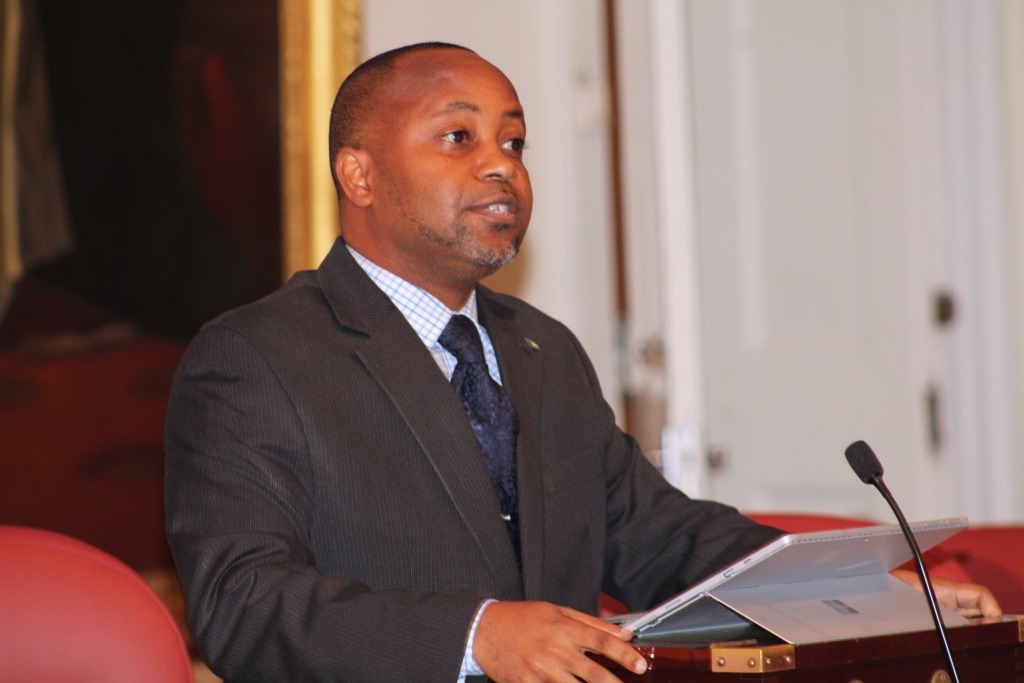
On Wednesday, December 16th, 2020, Prime Minister and Minister of Finance the Most Hon. Dr. Hubert A. Minnis tabled in the Lower House, the Government’s 2020 Fiscal Strategy Report (or FSR).
(See full FSR here: http://eleutheranews.com/wp-content/uploads/2020/12/2020FSRCommunication-MinofState_FINAL-Dec-16.pdf)
Minister of State in the Ministry of Finance, Senator the Hon. J. Kwasi Thompson provided an overview of the 2020 FSR, which the public can review in detail on the official budget website: www.bahamasbudget.gov.bs.
This year, the Ministry also produced a Citizen’s Guide to the FSR to ensure Bahamians can easily access and digest the technical information contained within the report. This Guide will be published online and via the Ministry’s social media channels on Friday, December 18th, 2020.
Sen. Thompson explained that as the Prime Minister would have stated during his presentation, the Fiscal Responsibility Act, 2018 requires the Government to publish an annual FSR to outline its medium-term fiscal framework, including economic forecasts, fiscal targets, and priorities for revenue collection, spending, and borrowing. Importantly, this framework is used to guide the preparation of future budgets.
He said since the passage of the Fiscal Responsibility Act, the Government has received local and international recognition for its implementation, and commitment to meeting the fiscal targets.
“Prior to Hurricane Dorian and COVID-19, the Government’s efforts not only produced improved levels of transparency and accountability, but also resulted in improvements to the Government’s fiscal performance. In FY2018/2019, the fiscal deficit dropped to an historic low of 1.6 percent of GDP, coming in even below the 2018/2019 deficit target of 1.8 per cent of Gross Domestic Product (GDP).
“In September 2019, however, due to the unprecedented damage caused by Hurricane Dorian to the islands of Grand Bahama and Abaco, the Government was forced to deviate from its fiscal targets to fund over $138 million in direct support to impacted families and businesses during the 2019/2020 fiscal year.”
Sen. Thompson stated that these included $11.7 million to rehabilitate the water supply, $41 million on the electricity supply, $8 million on temporary housing, $21.9 million on hurricane clean-up activities and $10 million to assist small businesses.
He noted that in addition to these direct costs, the Government contended with significant revenue losses of $541 million versus the original budget and unplanned but necessary funding requirements to rebuild critical public infrastructure such as the Rand Memorial Hospital in Grand Bahama, the power and water supply infrastructure, as well as to provide support to rebuild residential communities and small businesses.
Sen. Thompson said the impact of Hurricane Dorian and COVID-19 on The Bahamas’ fiscal position resulted in a decline in the Government’s key deficit to GDP ratio in the 2019/2020 fiscal year to 6.5 per cent, greater than its targeted deficit of 5.3 per cent of GDP established post-Dorian.
He stated that this impact also necessitated a revision in the timeline to achieve the targeted deficit of 0.5 per cent of GDP from 2020/2021 to 2024/2025 to allow for rebuilding and restoration of the domestic economy as outlined in the Government’s 2019 FSR.
Sen. Thompson said, “The 2020 FSR is the third to be approved by Cabinet and submitted to Parliament under the Fiscal Responsibility Act. It is the second FSR to be prepared under unprecedented circumstances.
“The Bahamas recorded its first cases of COVID-19 in March 2020, around the time that the Coronavirus was declared a global pandemic by the World Health Organisation. Our proactive and robust response necessitated the imposition of extreme health and safety measures to protect Bahamian lives.
“These life saving measures included not only restrictions on the movement of persons, but also border closures which limited economic activity. Although these measures were absolutely necessary, the consequences have been far reaching, including a severe contraction in economic activity and a record increase in unemployment.”
He stated that while the economic fall-out from the pandemic hit The Bahamas in the last quarter of the 2019/20 fiscal year, the full impact has extended into the current 2020/21 fiscal year. And in our assessment, the risks of the COVID-19 pandemic to the Government’s fiscal plan are likely to remain elevated in the near term. “However, I am pleased to say, there are several domestic and global developments that provide hope for a positive turnaround.”
Sen. Thompson explained that to cushion the impact from the first and second wave of the pandemic, the Government implemented several relief initiatives to support health care, business continuity, employment, and social assistance needs—amounting to over 1.5 per cent of GDP in the 2020/2021 fiscal year.
Source:
Bahamas Information Services
Written by: Llonella Gilbert
